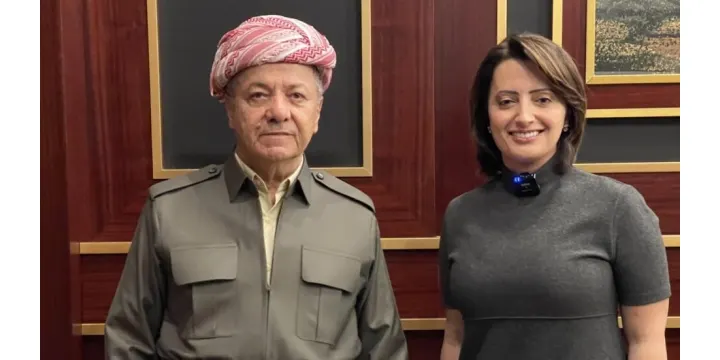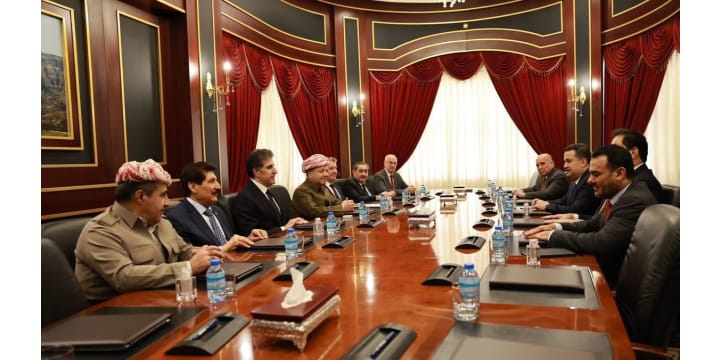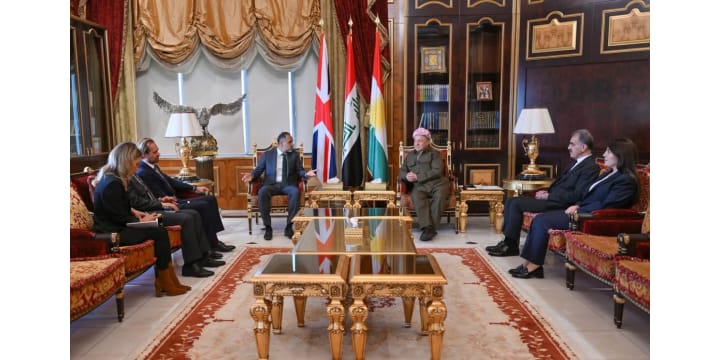
The Mont Carlo International interview with President Masoud Barzani.
Iman Al-Hamoud, guest of Mont Carlo International's special dialogue today is Kurdish leader Mr. Masoud Barzani, the head of the Kurdistan Democratic Party. We meet him here in Erbil, the capital of the Kurdistan Region. Welcome, sir, to the airwaves of Mont Carlo International.
Masoud Barzani: Hello and welcome.
Iman Al-Hamoud: Let's start with a question about what's happening. After a year and a half in Mr. Sudan's government, in which you participate, how do you evaluate the government's work or your role within the federal government?
Masoud Barzani: Our participation in Mr. Sudan's government was based on a political agreement, forming a state administration coalition based on this political agreement. What we observe is that Mr. Sudan wants to implement the political agreement reached between the parties. However, at the same time, we see real obstacles facing him. We supported him and will continue to support him to implement what we agreed upon, but he faces real difficulties.
Iman Al-Hamoud: What kind of difficulties are these?
Masoud Barzani: Difficulties preventing him from implementing the agreement reached between the parties.
Iman Al-Hamoud: Yes, preventing him... I mean, from certain parties... Are you accusing specific parties?
Masoud Barzani: I don't want to specify a particular party in itself, but there are parties trying to hinder the work of the federal government... very clear.
Iman Al-Hamoud: Yes, are you comfortable working within this government? I mean, your primary allies withdrew, like the Sadrists... Also, there are marginalized ones like Mr. Al-Halbousi. I mean, are you comfortable or concerned today?
Masoud Barzani: Honestly, we are concerned. Concerned because democracy is threatened in Iraq, a real threat.
Iman Al-Hamoud: Is the threat coming from within or from outside?
Masoud Barzani: From within and from outside.
Iman Al-Hamoud: Many news reports talk about difficulties in the region, especially regarding the relationship between Erbil and Sulaymaniyah. I mean, the relationship between the two competing parties in the Kurdistan Region, despite all past differences, but you used to go united to Baghdad. Today, you go divided. How can we explain the state of division in the region?
Masoud Barzani: This is indeed a regrettable situation. But honestly, there is a disagreement on strategic issues... on strategic goals. If it were a disagreement on tactical issues, it would be very easy. Nevertheless, we try and make every effort to overcome this problem and work to unify the Kurdish front as it was.
Iman Al-Hamoud: If we want to talk about strategic issues, it may be a broad topic. But what are the main obstacles to Kurdish unity, for example?
Masoud Barzani: We cannot compromise on the existence of the region. We cannot cooperate with those who seek to dismantle the region, nor ally with those who want to end it. This is the strategic issue.
Iman Al-Hamoud: Yes, and in your opinion, who is actively attempting or aiming for this goal?
Masoud Barzani: Very clear, of course.
Iman Al-Hamoud: Let's be more direct. You were born in Iranian Kurdistan, and your relationship with Iran has been relatively good. However, there has been a noticeable deterioration recently. Iran accuses you of providing shelter to its enemies. How do you respond to these accusations?
Masoud Barzani: These are baseless accusations. Iran knows, more than anyone else, that these accusations are baseless. Yes, I was born in Mahabad, and we never wanted, at any time, for there to be tense relations with Iran. We did not allow the region to be a threat to Iran's security.
Since 2020 and 2021, Erbil, as a city and province, has been subjected to 143 drone or ballistic missile attacks by Iran or its followers. These crimes are always justified by claiming the presence of international intelligence centers, specifically Mossad or Kurdish opposition in Kurdistan. If there were a Mossad headquarters, they wouldn't insist on striking it.
The Iranian opposition has been present for 50 years, and based on a tripartite agreement between the federal government, the regional government, and Iran, and in response to the Kurdish Iranian opposition, all their forces were withdrawn from border areas and returned to residential areas on the outskirts of Erbil. This was based on an agreement.
Therefore, Iran's accusations are truly baseless. We never wanted, at any time, for relations to tense with Iran. However, we also wonder why Iran chose this approach.
Iman Al-Hamoud: Has the federal government done what is necessary in response to what happened in Erbil?
Masoud Barzani: It moved, but in reality, the response was not at the level of the committed crime.
Iman Al-Hamoud: The current controversy in Iraq revolves around the issue of the withdrawal of coalition forces. Let's be more explicit: the withdrawal of Americans from Iraq. Does this concern the Kurds?
Masoud Barzani: Perhaps the same scenario that happened in 2011 when the US forces withdrew and withdrew with coalition forces is repeating. After a while, we saw ISIS, occupying almost a third of Iraq. If it weren't for the support of the coalition, the situation would be different. There was an agreement between the federal government, the US, and the coalition, and this agreement has been in effect for 10 years. Perhaps this agreement needs review, but this is within the jurisdiction of the federal government and the relevant authorities, not the factions or groups. It is a crucial issue related to all Iraqis, and one party cannot make any decisions on this matter.
Iman Al-Hamoud: Internally, there are economic difficulties in the region. There is popular discontent regarding the delayed salaries of employees, coinciding with the suspension of oil exports from the Kurdistan Region. How do you view the recent decisions of the federal court regarding salaries and the region's revenues?
Masoud Barzani: Unfortunately, all the decisions of the federal court are overwhelmingly biased against the region. For your information, this court is not a constitutional court. It was formed during the time of Bremer and is now playing the roles of the judicial, legislative, and executive branches. I believe the federal court has exceeded its powers and fundamental duties. Its decisions are unfair and unjust, overwhelmingly against the region.
Iman Al-Hamoud: Mr. President, I want to touch quickly on a point that raises concerns for some of your friends in the West, if I may express it that way. Does the third generation of Kurdish politicians, after the founding generation and your generation that knew both armed struggle and negotiations, have the capability to face all the challenges the region is currently experiencing?
Masoud Barzani: A beautiful question. I also had the same concerns, but during the war against ISIS, we suffered for about two months. However, a new generation emerged after that, more resilient, more experienced, and with stronger determination. Yes, there is a new generation, and we cannot say that it has not been influenced by technological advancements and the developments that occurred worldwide. But now there is a trained generation equipped with weapons, thought, and determination. So, I say with all honesty, we are not afraid, and we have hundreds of thousands of youth who may surpass what the first and second generations achieved.
Iman Al-Hamoud: Very good. So, five years have passed since the historic referendum you organized regarding the Kurdish right to self-determination. What actually happened is a deterioration in relations with the central government. But is federalism considered a practical idea in the countries that know it in this region?
Masoud Barzani: After the fall of the regime in 2003, the Kurdistan Parliament decided to adopt federalism and establish relations with Baghdad on this basis. I spent long periods in Baghdad after the fall of the regime, and during the drafting of the constitution as well, we worked diligently and sincerely to build a democratic, pluralistic, federal Iraq.
After a while, we noticed that federalism... there are those who do not believe in it. Even the constitution retreated from what we agreed upon. The preamble of the constitution states that commitment to this constitution guarantees the unity of Iraq. The constitution was violated. If federalism were practical and committed to the constitution, we wouldn't have gone for the referendum.
Iman Al-Hamoud: How do you see the future of Iraq?
Masoud Barzani: Either Iraq adopts what has been agreed upon and returns to democracy and basic principles—participation, consensus, balance—then it is possible to save Iraq from the crisis it is going through. But monopolizing power and seizing everything by a specific group, entity, or component will lead Iraq towards abyss. Returning to democracy, the constitution, and basic principles of partnership, consensus, and balance is essential.
Iman Al-Hamoud: Yes, Mr. President, you've mentioned that the friend of the Kurds is the mountain today. Who are the friends of the Kurds?
Masoud Barzani: The mountain, plus many friends around the world.
Iman Al-Hamoud: Who are they?
Masoud Barzani: Many... they exist.
Iman Al-Hamoud: Does it include relations with neighboring countries?
Masoud Barzani: There are Arab countries, for example, with the Arab nations, with the West, with America, with the whole world, with the East... I mean, thankfully, we have many friends.
Iman Al-Hamoud: The support for the Kurdish cause remains as it was.
Masoud Barzani: There is understanding, there is support, but, in reality, it is not at the required level. Sometimes, a certain event comes that overshadows all other events, such as the war in Ukraine, the war in Gaza. Sometimes, interests shift from one place to another.
Iman Al-Hamoud: Kurdish leader Masoud Barzani, the head of the Kurdistan Democratic Party, thank you for providing this opportunity for Mont Carlo International and thank you for this interview.
Masoud Barzani: Thank you... to Mont Carlo.

